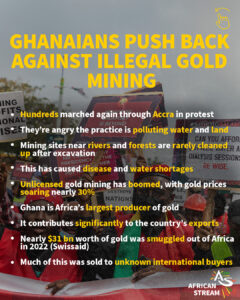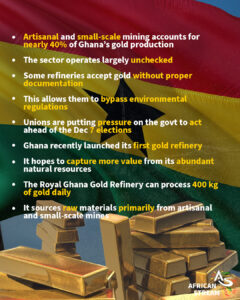
Hundreds of Ghanaians again took to the streets on Friday to urge their government to crack down on illegal gold mines. The protests, the biggest yet, were planned by the Trade Union Congress. Activists are angry that illicit excavation is polluting rivers and damaging the soil across the country while offenders go unpunished.
With the price of gold skyrocketing by nearly 40%, the country is witnessing a surge in unlicensed mining. It’s led to increased use of large excavation machinery and dredging equipment near rivers and forests – with no effort to clean up or regenerate the environment after excavation. This has led to disease and water shortages.
Artisanal and small-scale miners operate with less regulation and oversight, often flouting environmental rules. Unions are now intensifying their pressure on the government to take immediate action and shut down illegal mines before elections on 7th December.

Ghana recently launched its first gold refinery to capture more value from its abundant natural resources and help reduce illegal processing. The Royal Ghana Gold Refinery can process 400 kilograms of gold daily, primarily sourcing raw materials from artisanal and small-scale mines. Ghana is Africa’s largest gold producer, contributing nearly half of the country’s exports.
